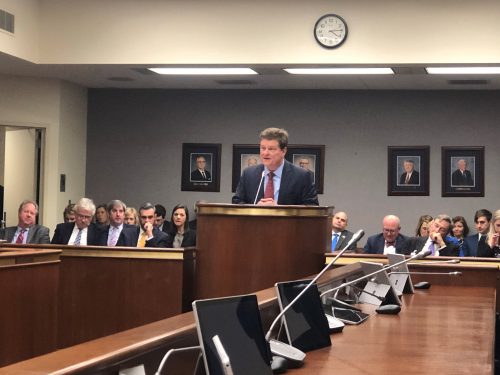Sometimes all a good idea needs is a lawmaker to just say “enough!”
Here’s something we learned this week: sometimes all a good policy proposal needs is a key elected official to simply say: “enough!”
The first example of the effect of this Total Legislative Exasperation is on the issue of Santee Cooper. Many observers of Statehouse life were quite sure that when the SC Senate established a separate Senators-only committee to study the future of Santee Cooper, that was code for “we aren’t selling.” The State newspaper called the new Senate Committee “a wrench” to the idea of a sale. Was that the case? Possibly. But that was before Santee Cooper executives appeared before the new Senators Only study committee.
To put it mildly, it didn’t go well. Santee Cooper leaders couldn’t provide answers to basic questions asked by the Senators about future electricity rates. So, within 24 hours, the formerly sell skeptic Senate President Harvey Peeler (R-Cherokee) filed S.678 with this phrase as its bottom line: “The Governor shall…execute the sale to the bidder who best safeguards the interests of Santee Cooper’s ratepayers and the State’s taxpayers. The net proceeds of the sale shall be deposited in the State’s general fund.” Senator Nikki Seztler (D-Lexington) didn’t mince words, saying the presentations were “absolutely astounding in their lack of information and cooperation.” (A similar resolution had been in the works in the House for quite some time, and six key leaders in that body filed it the day after the Senate measure as H.4287.)
Also on the House side, it was new Ways & Means Chairman Murrell Smith’s (R-Sumter) turn to vent. Smith has been concerned for years that the state’s Certificate of Need (CON) law has been making the building of needed new medical facilities too hard…and too expensive. PPI has argued that laws that require the state to bless the building of a new medical facility with an official “Certificate of Need” is an insult to free enterprise. (That, and the fact that CONs do not reduce costs or lead to more free medical care for the poor as supporters claim.) I made those points before the Ways & Means Committee this week (adjacent photo). Key moment: Chairman Smith made it clear that it was time for CON to die in South Carolina. For his part, the only beneficiaries to the current system are the lawyers litigating whether a provider has the right to build. Strong.
Our third “enough!” incident of the week was not so dramatic, but was equally as positive for the future of how we fund schools in South Carolina. Matthew Joseph of the Foundation for Excellence in Education (ExcelinEd) was at the Statehouse to present his new paper published jointly by PPI and ExcelinEd. The point of his research was that South Carolina education funding in not “student-centered,” which makes fair, simple and transparent funding impossible. The reaction among General Assembly leaders (and even staff) to Matthew’s incredibly detailed analysis was passionate and positive…and has added fuel to the fire lit by PPI’s Dr. Rebecca Gunlauggson earlier. The Governor agrees with the concept, and has tasked the state Revenue and Fiscal Affairs Office to make recommendations to move the “dollars follow the child” concept forward.
PPI’s priorities got a boost this week when key players made it clear that the time for action has come. Kudos to them.





